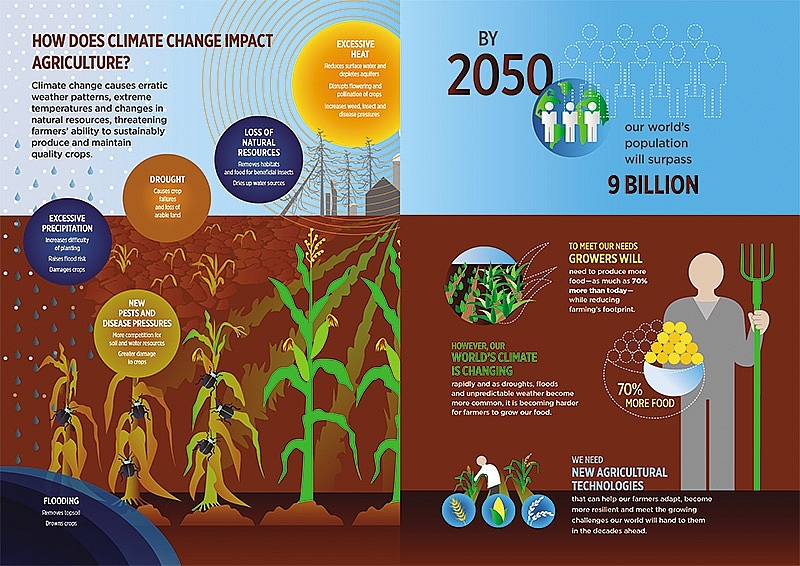Farming pressures must be tackled with innovation
 |
As reported by the World Bank, Vietnam has been ranked among the five countries likely to be most affected by climate change. In the past 50 years, Vietnam’s mean temperature has increased by 0.5-0.7°C and the sea level has risen by 20 centimetres. Climate change has made natural disasters, especially storms, floods, and droughts, increasingly violent.
The Mekong Delta is one of the world’s three most vulnerable deltas, and is crucial for agricultural production in Vietnam. However, saltwater intrusions and drought in the Mekong Delta have made it clear that something needs to be done to reverse the impacts of climate change. It is not possible for Vietnam to stop climate change on its own. Adoption of plant science solutions plays a key role in helping farmers, especially small-holders, deal with these challenges. Scientists are developing crops tolerant to drought, salinity, and other environmental stresses to adapt to changing climates. Climate change is pushing pests and diseases into new geographical areas. Crop protection products are being created to protect staples like corn, soybeans, rice, wheat, and cotton against drought, high heat, and other conditions likely to emerge from climate change. Such products can help farmers increase their yields despite the evolving threat and unanticipated changes in pest populations. Vietnam’s small-holder farmers rely on crop protection products to prevent pests, disease, and weed pressures from damaging their crops and limiting their harvests. And as the impacts of climate change in Vietnam and across Asia grow, the various pressures will become more extreme, making effective use of crop protection more important than ever.
Existing genetically modified (GM) crops equipped with insect and disease resistance solutions as well as crop protection products indirectly reduce emissions by increasing crop yields, preventing expansion of farmland into rainforests and other wilderness areas that are critical carbon sinks.
A 2017 study conducted jointly by PG Economics and the Crop Production Department under the Ministry of Agriculture and Rural Development on “The potential impacts from GM corn adoption in Vietnam” showed that use of GM corn is likely to lead to both socio-economic and environmental benefits.
“The net environmental impact associated with herbicide use with biotech corn is likely to be a reduction in both the average amount of active ingredient used and the associated environmental impact. At 20 per cent adoption, a 1.5 per cent decrease in herbicide use and 9.1 per cent improvement in the Environmental Impact Quotient (EIQ) rating. At 60 per cent adoption, a 4.6 per cent reduction in herbicide usage and a 27 per cent improvement in the EIQ rating,” the report said. “Biotech corn will allow farmers to stop using insecticides to control pests. At 20 per cent adoption, a saving of one third of total usage. At 60 per cent adoption almost all insecticide use on crop will be eliminated, meaning around 250,000-300,000 kilogrammes of insecticide active ingredient will be reduced per year.”
CropLife maintains a committed partnership with the Vietnamese government to find out what seeds, traits, good farming practices, and agrochemicals are suitable to deal with these changes. Several initiatives have already shown the positive effects of using technology in agriculture. More initiatives will be developed, such as precision or smart farming and advanced chemical analysis techniques. Crop protection products and biotech crops are critical to mitigating problems associated with climate change and global warming. These plant science tools are significantly reducing the impact of agriculture on the environment, and the impact of climate change on agriculture.
What the stars mean:
★ Poor ★ ★ Promising ★★★ Good ★★★★ Very good ★★★★★ Exceptional
 Tag:
Tag:
Related Contents
Latest News
More News
- Trung Nam-Sideros River consortium wins bid for LNG venture (January 30, 2026 | 11:16)
- Vietnam moves towards market-based fuel management with E10 rollout (January 30, 2026 | 11:10)
- Envision Energy, REE Group partner on 128MW wind projects (January 30, 2026 | 10:58)
- Vingroup consults on carbon credits for electric vehicle charging network (January 28, 2026 | 11:04)
- Bac Ai Pumped Storage Hydropower Plant to enter peak construction phase (January 27, 2026 | 08:00)
- ASEAN could scale up sustainable aviation fuel by 2050 (January 24, 2026 | 10:19)
- 64,000 hectares of sea allocated for offshore wind surveys (January 22, 2026 | 20:23)
- EVN secures financing for Quang Trach II LNG power plant (January 17, 2026 | 15:55)
- PC1 teams up with DENZAI on regional wind projects (January 16, 2026 | 21:18)
- Innovation and ESG practices drive green transition in the digital era (January 16, 2026 | 16:51)






















 Mobile Version
Mobile Version